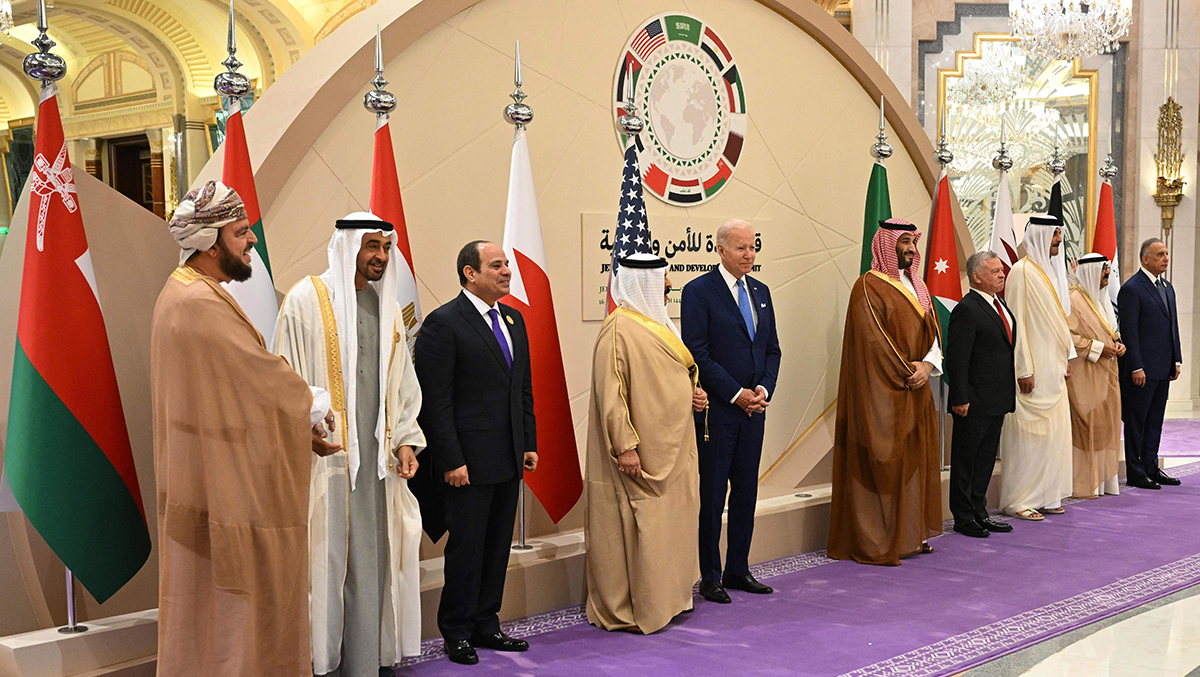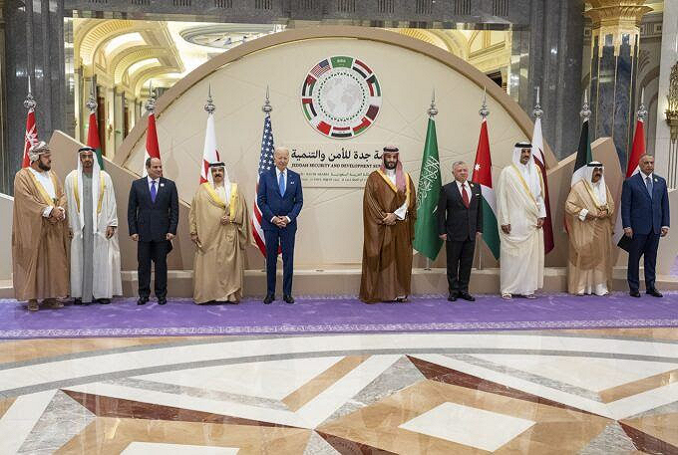[ad_1]
Learn in PDF
The principle goal of President Joe Biden’s journey to the Center East final week was to sign to each companions and adversaries that the US was severe about restoring its strategic place within the area, which has taken appreciable hits lately. Opposite to traditional knowledge, the go to was not meant to safe instant agreements from Saudi Arabia and the United Arab Emirates on elevated oil manufacturing, as invaluable as this final result or others associated to strategic competitors with China and Russia would have been for U.S. pursuits.
Give Biden some credit score. Though he knew that assembly with the Saudi management would price him politically at house and presumably upset a number of senior members of his personal administration, he however went to Jeddah as a result of he rightly put the journey in its correct strategic context. This was not in regards to the Saudis, the Emiratis, the Israelis, or anyone else. It was initially about America and its standing in a area that has confirmed but once more its strategic significance to world safety and commerce and particularly to U.S. long-term pursuits throughout the globe.
The query is whether or not Biden has mentioned or completed sufficient throughout and after the journey to persuade skeptical companions that America shouldn’t be leaving the area. The administration’s strategic messaging previous the go to actually didn’t assist. It was subpar, if not complicated. Biden did publish an opinion piece in The Washington Submit to elucidate his causes for his journey to the area, but it surely lacked each readability and coherence.
That’s unlucky as a result of this chaos in strategic communications doesn’t mirror the scenario on the bottom when it comes to U.S.-Arab military-to-military relations. Operational ties are growing fairly properly with an eye fixed towards realizing the objectives set out by this administration and ones earlier than it, all centering on the creation of simpler types of U.S.-Arab-Israeli safety cooperation.
The pinnacle of U.S. Central Command (CENTCOM), Gen. Erik Kurilla, has been instructed by civilian management to work towards navy integration between the US and its regional companions in addition to amongst these companions themselves. Few missions in navy affairs are more difficult. First, the US has by no means completed this earlier than with any of its Arab companions (though it has completed it on some stage with Israel). Second, all of the political, procedural, technical, bureaucratic, and monetary stars should align for this to work. Third, this is not going to occur in a matter of months — it’s going to take a few years.
Nonetheless, CENTCOM is patiently and methodically laying the groundwork. Crucially, there are additionally the Abraham Accords and the official inclusion of Israel into CENTCOM — strategic developments that may have some very constructive results on this mission of integration. The Israelis have exceled at integration for years and possess cutting-edge know-how that could possibly be helpful to the Arab companions. Briefly, Israel might be one of many catalysts for achievement.
However we’re those who should lead and play the position of enabler and facilitator. We’re the indispensable hub. Strategically, we are going to stay targeted on deterring Iran, countering violent extremist organizations, and pursuing strategic competitors with China and Russia, partly by revitalizing and sustaining our regional partnerships. Functionally, our priorities are to pursue built-in air and missile protection and counter unmanned aerial programs.
Gone is the obtuse idea of a Center East Strategic Alliance, or MESA, as coined by the Trump administration, which was unlikely to see the sunshine of day primarily due to the dearth of belief and totally different menace perceptions amongst regional gamers. A extra severe, reasonable, and gradual framework is now in place, referred to as the Regional Safety Assemble, or RSC. Its pillars are built-in air and missile protection, maritime safety, disaster response, particular operations forces, and theater sustainment and fires.
Every pillar has a procedural, technical, and integration part. The procedural half, which is instant, ensures that each one individuals have a transparent understanding of the menace atmosphere. The technical half, which is medium time period, is important to realize and keep interoperability. The long-term integration half is important to ascertain interconnected programs throughout domains in addition to safe communications. All of those phases would require an infinite quantity of labor and cooperation by way of coaching, workouts, gear, authorities, and doctrine. It actually is a heavy carry, however it’s exactly what is required to achieve not less than a measure of navy integration with not less than some key regional companions.
Constant engagement with regional leaderships to evaluate, monitor, and consider all these actions that make up the RSC might be essential, which is why, along with common bilateral conferences, CENTCOM has provide you with two regional conferences — one on the two-star stage, taking place each three months, and one other on the four-star stage, to be held each six months with the chiefs of protection within the Gulf Cooperation Council plus Egypt, Jordan, and Iraq (GCC+3).
Among the many most tough duties for Gen. Kurilla might be to transparently describe to all regional companions the challenges of accomplishing any stage of navy integration, be it bilateral or multilateral. It took NATO, essentially the most highly effective alliance on the planet, a long time earlier than it achieved it, and there’s nonetheless room for enchancment. Reaching this goal is tough not solely as a result of it calls for an immense quantity of sensible work, talent, persistence, and self-discipline but in addition as a result of it requires a brand new mind-set and behaving on the a part of regional companions who traditionally have had a tough time working collectively and accepting the idea of interconnectedness. Protection reforms and a dedication to institutional capability constructing are conditions to efficient integration. Companions don’t simply combine {hardware}, they have to additionally combine ideas, processes, establishments, and governmental and navy cultures, all of that are poor within the Arab world to start with.
We’ve made horrible errors ourselves within the Center East with regards to safety cooperation, and constantly so. We’ve targeted virtually completely on vehicles and weapons in addition to entry and basing. We paid lip service to actual partnership. However, maybe worst of all, we’ve been strategically inconsistent. Center Japanese leaders have come to count on that U.S. dedication to their area will continuously waver, wax, and wane, thereby creating an impression that we search strategic consistency from them in methods we’re unwilling to display ourselves. We’re starting to vary our perspective and strategy towards the area, however it’s going to take a while to align our huge nationwide safety forms with our new imaginative and prescient.
But regardless of how profitable we’re on the bottom, none of that is going to work with out readability and consistency in U.S. coverage and technique nor absent sturdy U.S. management to help and allow these invaluable navy initiatives. That’s the reason Biden’s journey to the area was vital — it was a primary step in what might be a journey meant to influence our regional companions that we stay the chief of selection and world companion within the Center East and elsewhere. It’d properly be Biden’s first and final step if he isn’t reelected. However what issues most is that this new strategic strategy to the area survives political change in Washington, which, if historical past is any information, is simpler mentioned than completed.
Kevin Donegan is a distinguished senior fellow with the Protection and Safety Program on the Center East Institute (MEI) and a former commander of the U.S. Naval Forces Central Command and the U.S. Fifth Fleet. Mick Mulroy is a nonresident senior fellow with the Protection and Safety Program at MEI and a former Deputy Assistant Secretary of Protection for Center East Coverage. Michael Nagata is a distinguished senior fellow with the Protection and Safety Program at MEI and a former commander of U.S. Particular Operations Command Central. Bilal Y. Saab is a senior fellow and the director of the Protection and Safety Program at MEI and a former senior advisor for Center East safety cooperation within the Workplace of the Underneath Secretary of Protection for Coverage. Joseph Votel is a distinguished senior fellow with the Protection and Safety Program at MEI and a former commander of U.S. Central Command. The views expressed on this piece are their very own.
Photograph by MANDEL NGAN/POOL/AFP through Getty Photographs
The Center East Institute (MEI) is an unbiased, non-partisan, non-for-profit, academic group. It doesn’t interact in advocacy and its students’ opinions are their very own. MEI welcomes monetary donations, however retains sole editorial management over its work and its publications mirror solely the authors’ views. For an inventory of MEI donors, please click on here.
[ad_2]
Source link








